Imagine if you have a clone which can do less interesting work for you, such as attending events, dialing conference calls, sitting in meetings, visiting doctors, meeting social obligations, etc. and can be present at different places while you are doing real work (for me, that’s reading a book or writing research in my study), how much productive you can be. Well, we don’t know whether we will have such human clones in our lifetime, but in engineering industry, digital clones are definitely beginning to appear.
Call it the digital clone, digital twin or digital thread, it is now possible to represent industrial products digitally – opening the door for amazing possibilities. It starts even before products are manufactured where all the data from design, analysis and manufacturing can be digitized and connected by a digital thread. This can lead to the construction of the digital clone or the digital twin of each manufactured product.

As Game of Thrones is driving the entertainment industry, the Game of Digital Clones will drive engineering services industry.
Take an example of industrial machinery operating in a manufacturing plant. Now a number of sensors can be placed on each machinery and its output can be simulated back to the digital clone. These sensors can track all machinery parameters such as vibration, temperature, humidity, etc. The exact behavior of the product can be simulated on the digital clone in the real time. Each industrial product is made of thousands of systems, subsystems, parts, and subparts. Imagine the ability to simulate behavior, not only at the product level, but at the system, subsystem part and even subpart level. What kind of insights and possibilities it can generate? And all this without stopping the products from working or tearing them down. All product information can be available, anywhere and anytime.
This will tell us when the product will need maintenance, when it can break, how it can react in changed circumstances, how it will be serviced, etc. All this intelligence can go back in designing better parts, better systems and subsystems and ultimately better products. Also, each OEMs have hundreds of tier 1 and tier 2 service providers and sharing this digital information with them can develop better products.
Initially, these digital clones use cases are largely for the optimization of existing products. However, this will be even more helpful in the innovation and design of new products. The digitalization of the whole process of design, testing and operation of new products, using digital clones, will significantly reduce the time from design to manufacture of new products. It can lead to challenge of some of assumptions we make while designing the products. Some of the engineering theories and best practices, which have stood the test of time for the lack of better data and experiments, can be significantly augmented with a digital clone model – this is about enhancing capabilities, not constraining them. And combine the digital twin with robotics, 3D printing, composites these are interesting possibilities awaiting us to say the least.
And digital clones don’t need to be confined to industrial machinery – cars, locomotives, planes, medical devices, turbines, pipelines, etc – any manufactured item can be digital cloned and improved. In fact, digital clones will move beyond products and vehicles to houses, buildings, factories – in the construction industry, they being applied in the form of BIM (Building Information Modelling). Governments are mandating construction of BIM, which will have details of all construction, plumbing, electricity etc at the granular level. Digital clones can be applied to whole towns or cities. We can go as far as privacy debate permits, but the possibilities are endless.
Manufacturing companies cannot play this Game of Clones themselves as their expertise is in manufacturing physical products, not developing software tools – they will need support in developing digital clones and exploring all possibilities it can bring with it, otherwise, they will be at a significant competitive disadvantage. Digital clones represent a golden opportunity for all consulting firms, IT service providers, engineering service providers and even BPO service providers. Like Game of Thrones, in Game of Clones, manufacturing companies will need all the help they can!
I think this is the most disruptive trend which is hitting manufacturing industry and this the backbone of Industry 4.0, the fourth industrial revolution. The combination of cheap sensors, storage, computing, analytics, and connectivity is enabling digital clones and Industry 4.0 now.
Considering its importance, our next two engineering services Blueprints will focus on uncovering this trend. This digital thread is driving adoption of PLM services and we will cover it in our recently launched HfS PLM Services Blueprint Study. In our next HfS Manufacturing As-a-Service study we will explore the digital clone and Industry 4.0 development in much greater details. If you are interested in participating these studies, please drop a line to [email protected]
On the closing note, engineering services providers which will not be ready to play Game of Clones will have to prepare for a long winter!
Posted in : Procurement and Supply Chain






